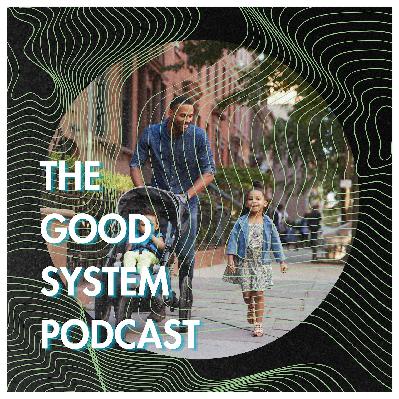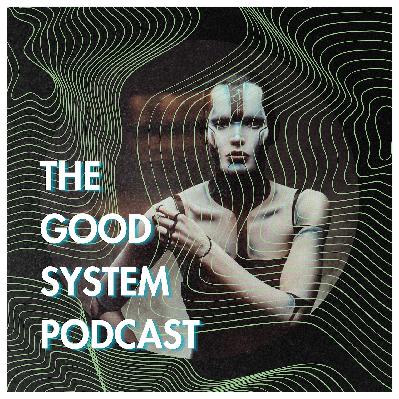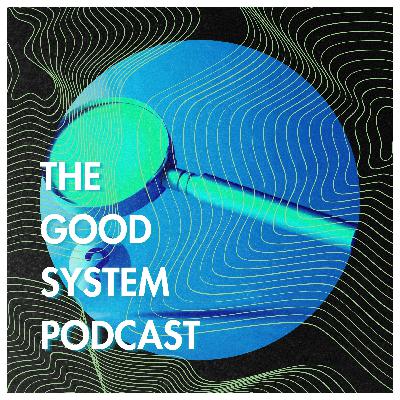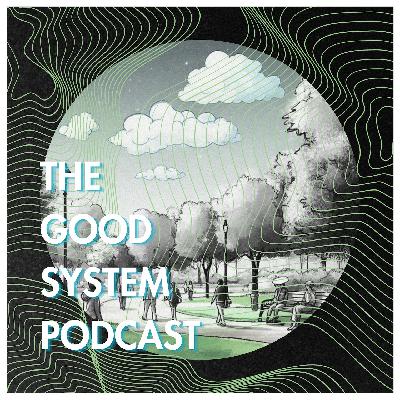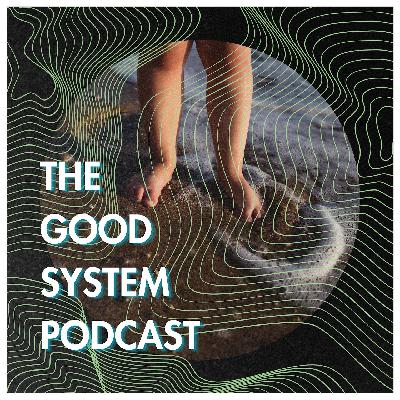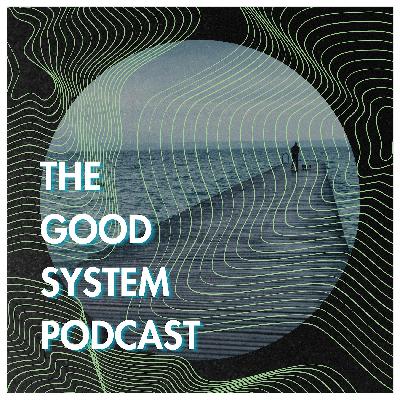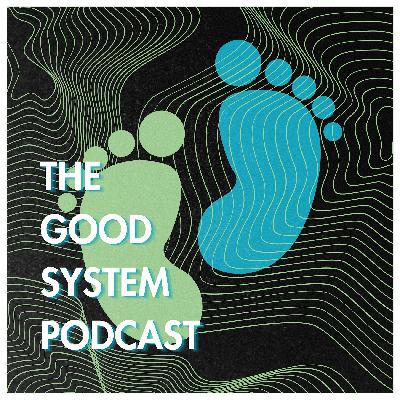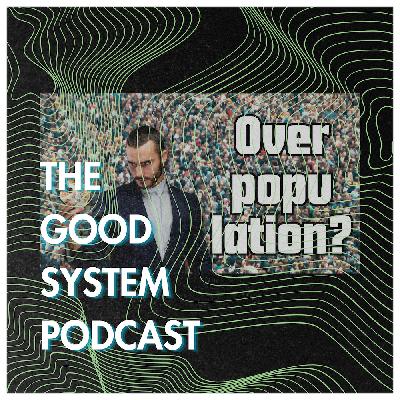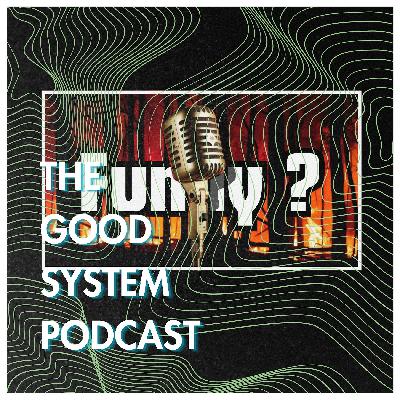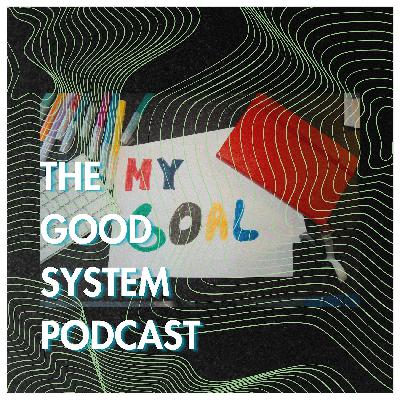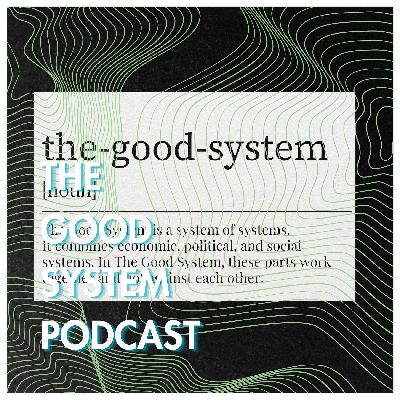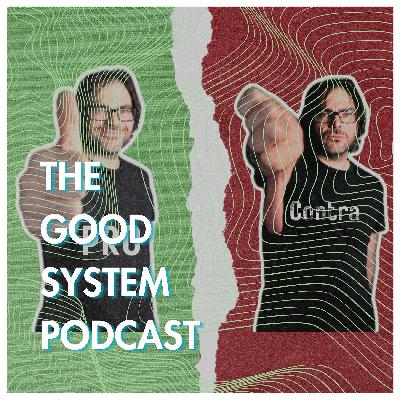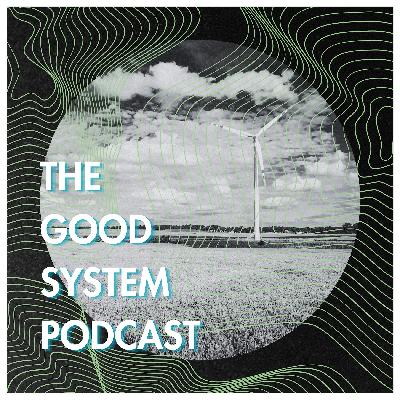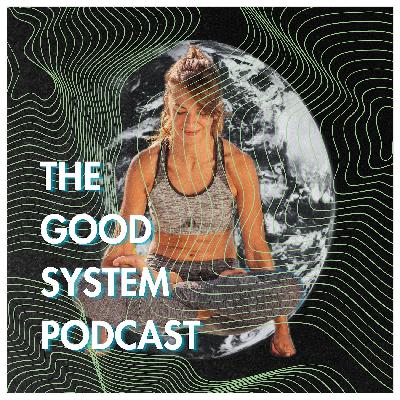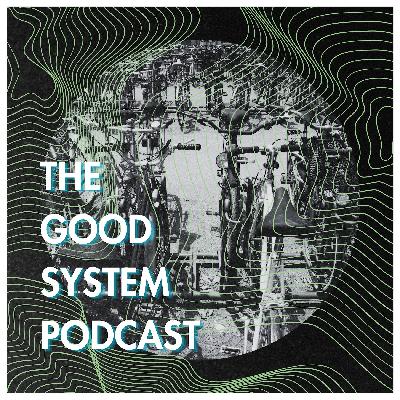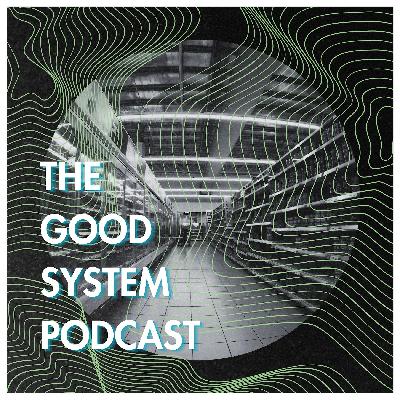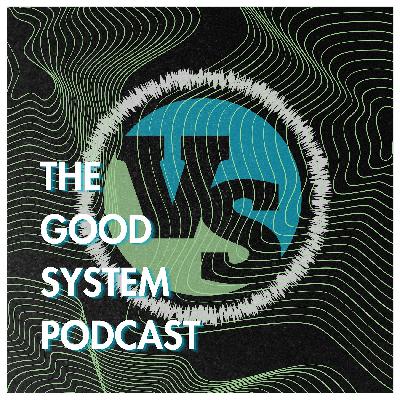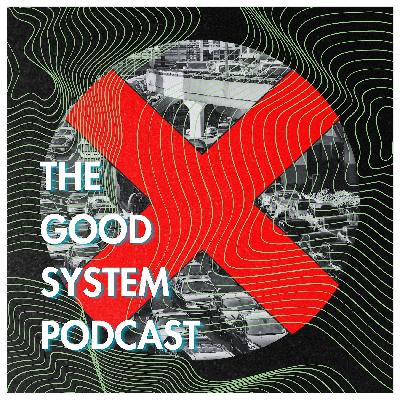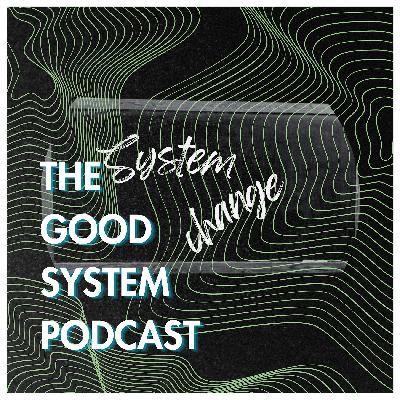Discover The Good System Podcast
The Good System Podcast

The Good System Podcast
Author: Ian DeBay
Subscribed: 1Played: 4Subscribe
Share
© 2025 Ian DeBay
Description
Our current system is crumbling down. In The Good System I am, Ian DeBay, searching for a way to change the system. We create a system together, that is good for everyone and the planet.
The topics are sustainability, education, politics, infrastructure and more.
The topics are sustainability, education, politics, infrastructure and more.
23 Episodes
Reverse
So there I was, sitting in a Turkish barbershop in Vienna, conducting an invisible orchestra with my hands while trying to explain how I wanted my hair cut. Twenty minutes later, I walked out looking like I'd lost a fight with a lawnmower – and that's when it hit me: we're approaching this whole universal language communication thing completely backwards. Here I am, a non-native English speaker hosting a podcast about building a better world... in English. The irony is so thick you could cut it with a linguistic knife, but it perfectly illustrates the trap we're all stuck in.
This episode dives deep into why English became the global lingua franca (spoiler: it wasn't because of superior grammar), how universal language communication could actually work through constructed international auxiliary languages, and why the future might need its own tongue. We're talking about power, oppression, connection, and the beautiful chaos of linguistic diversity – because if a simple haircut can turn into a communication disaster in multicultural Vienna, imagine what's happening in boardrooms, hospitals, and diplomatic meetings around the world. The goal isn't to replace languages but to create a universal second language that belongs to no one and everyone, designed for equity rather than empire.
Key Points:
English dominance isn't neutral – it comes with heavy colonial baggage and gives native speakers an unearned advantage in international settings, affecting everything from job interviews to diplomatic negotiations
Constructed languages like Esperanto offer a solution – imagine a universal second language designed for clarity and equity, supplementing (not replacing) local languages while preserving beautiful linguistic diversity
Universal language communication could transform global cooperation – from medical emergencies to climate negotiations, having a language designed for understanding rather than historical conquest could make us better at solving planetary challenges
This is the article the episode is based on: https://iandebay.com/the-good-system/why-we-need-a-universal-language/
These are my YouTube channels:
https://www.youtube.com/@Ian_DeBay
https://www.youtube.com/@Ian_Debay_Shorts
https://www.youtube.com/@Ian_DeBay_Podcast
This is the link to my newsletter: https://iandebay.substack.com
Chapters
(00:00:00) - The Future of Language Is in Your Hair(00:03:59) - The Problem With English(00:08:39) - A Universal Language(00:17:48) - A Universal Language(00:22:27) - A Universal Language for the Future
Picture this: You're stuck behind a Karen in an SUV honking at a crosswalk because people are actually walking across the street. Meanwhile, the solution to our city nightmares isn't flying cars or hyperloops—it's something so ridiculously simple we've convinced ourselves it's impossible. In this episode, I confess my double life as "The Walking Dad" and reveal how walking—this thing humans have been doing for literally millions of years—has become an act of rebellion. From discovering hidden parks that are invisible from car level to nearly getting my son run down on a crosswalk by a reversing SUV, I share the personal stories that made me realize walkable cities aren't just better for our health and environment—they're the secret weapon for building communities that actually work.
But here's the plot twist: Walking was murdered, and it wasn't an accident. We've created urban environments so hostile to human beings that parents drive their kids to school not because they're lazy, but because they're genuinely afraid their children might die on infrastructure supposedly designed for them. From construction sites that prioritize car traffic over children's safety to the linguistic programming that makes us call them "sidewalks" (as if pedestrians are just sidekicks), I dive into the economic conspiracy that killed walking and why the 15-minute city concept is actually punk rock transportation. This isn't utopian fantasy—it's remembering how successful cities worked for thousands of years before we decided to organize human settlements around the convenience of automobiles.
Key Points:
• Walking is economic dynamite we're ignoring - Pedestrians are shopping ninjas who stop, browse, and buy, while drivers zip past businesses at 50km/h contributing zero dollars to local economies except when desperately searching for parking
• The 15-minute city isn't a conspiracy, it's how cities worked for millennia - Everything you need for daily life accessible within a 15-minute walk isn't some New World Order plot—it's literally how human settlements functioned before we decided metal boxes were more important than people
• Making walking cool again requires cultural hacking - We need walking influencers, Instagram-worthy urban exploration, and apps that gamify discovery instead of just guilt-tripping you about step counts, because cycling has cool gear while walking just has comfortable shoes
Links:
This is the article the episode is based on: https://iandebay.com/the-good-system/why-walkable-cities-are-my-secret-obsession/
These are my YouTube channels:
https://www.youtube.com/@Ian_DeBay
https://www.youtube.com/@Ian_Debay_Shorts
https://www.youtube.com/@Ian_DeBay_Podcast
This is the link to my newsletter: https://iandebay.substack.com
Chapters
(00:00:00) - The Simple Solution to Our City Nightmares(00:01:32) - I Am The Walking Dad(00:05:23) - The secret park that car drivers can't see(00:10:39) - The 15-Minute City(00:16:44) - Walking for People, Not Cars(00:24:19) - The Good System: Episode 20
Picture this: it's 2035, you wake up at noon with literally nothing to do because your AI assistant has organized your life, your robot cleaned your house, and your job doesn't exist anymore. Oh, and your bank account is empty because while machines took over your work, nobody figured out how you're supposed to survive. Welcome to the AI revolution we're building right now, whether we want to or not. This isn't another AI panic podcast about robot overlords - this is about the much weirder and more immediate reality of how artificial intelligence is about to completely reshape society as we know it.
We're standing at the edge of the biggest transformation humanity has ever seen, and we're sleepwalking into it like we're heading to brunch on a Sunday morning. While AI companies paint beautiful pictures of a future where you'll have time to pursue pottery and write novels, they conveniently skip over the tiny logistical issue of our entire economic system collapsing. When 40-70% of jobs disappear over just a few years, where exactly will governments get tax revenue? And why are the people making these decisions - the ones who'll own the robots - sitting in front row seats at inaugurations while the rest of us figure out how to survive the biggest wealth transfer in human history?
Key Points Discussed:
• AI job displacement timeline - We're looking at 40-70% of jobs disappearing over years, not decades, creating an unprecedented economic disruption
• The tax revenue crisis - Our entire system depends on people working and paying taxes; AI job displacement threatens the foundation of how we fund society
• Digital feudalism emergence - A handful of tech companies are building the infrastructure to replace human labor, creating a new aristocracy that owns algorithms instead of land
• Environmental impact reality check - While AI uses massive energy and water resources, the impact is manageable compared to livestock farming and could be solved with better renewable energy and heat recycling
• AI warfare concerns - Automated weapons and AI-powered conflicts remove human barriers to starting wars, potentially making conflicts more frequent and devastating
• Thomas Piketty's thesis on steroids - Just like historical aristocrats, those who own capital (now algorithms and robots) see wealth grow exponentially faster than workers can achieve
• Marx's relevance in the AI age - Marx's vision of workers benefiting from their labor could actually be achievable with AI doing the dangerous, boring work
• Universal Basic Income necessity - With traditional work disappearing, UBI becomes essential infrastructure, not radical socialism
• The power concentration problem - Major AI companies had front row seats at political events while orchestrating the transfer of economic power
• Hope for better systems - This future isn't inevitable; we can build public AI, redesign tax systems, and create technology that serves humanity instead of replacing it
Links and Resources:
This is the article the episode is based on: https://iandebay.com/the-good-system/how-ai-will-reshape-society-the-future-were-building-right-now/
Thomas Piketty Capital & Ideology as Graphic Novel ✱Affiliate Link
Thomas Piketty Capital in the 21st Century ✱Affiliate Link
Karl Marx The Communist Manifesto: A Graphic Nove...
Chapters
(00:00:00) - We're Building a Good Future With Artificial Intelligence(00:02:02) - The Future of Work Is Unraveling(00:10:01) - AI's Rise to Digital feudalism(00:14:54) - How AI Is Burning Through Our Planet(00:19:31) - What Happens If All Wars Are Won by Robots?
Episode Summary
The internet is optimized for machines, not humans anymore. If you aren't found on Google, if aren't on page one even, you do not exist.
So we end up with the ever same blog articles, that are readable for Google but not for humans.
While this may work for informational pieces, finding good art via Google is nearly impossible.
With AI, it will get worse. Now machines write for machines. We will end up in an endless vortex of mediocre SEO content.
In this episode, I talk about all this, and why I still think humans will be winning this game.
Be part of the challenge humans against Google. Share this episode to find out, if we have still more power than the search engines.
Related Links
This episode is based on this article: https://iandebay.com/thoughts/this-post-is-not-optimized/
Ian’s YouTube Channels:
https://www.youtube.com/@Ian_DeBay
https://www.youtube.com/@Ian_Debay_Shorts
https://www.youtube.com/@Ian_DeBay_Podcast
Subscribe to Ian’s Newsletter: https://iandebay.substack.com
Chapters
(00:00:00) - SEO and AI: The Good System(00:04:43) - How the Internet Is Destroying Creativity(00:14:06) - Getting to the Point(00:14:55) - Human Made Content Is in a Renaissance(00:19:35) - The Good System
Episode Summary
I tried meeting a friend downtown and realized there's literally nowhere to go without spending money. Every café wanted 7 euros for apple juice, park benches were designed to torture your spine, and the library was closed because "no one wants to work anymore." Welcome to late-stage capitalism's war on third places!
In this episode, I break down how we've systematically eliminated the spaces where people can gather, connect, and exist without opening their wallets. Third places aren't your home or workplace – they're the coffee shops, parks, libraries, and community spaces that make society actually function.
I explore why third places are disappearing (spoiler: it's always about profit), how this isolation is literally killing us, and what we can do to fight back. From Barcelona's car-free superblocks to Vienna's lingering coffee culture, I share examples of places getting it right. Because honestly, shouldn't we be able to exist in public without justifying it through consumption?
Key Points
• Third places are dying because our economic system treats every space as wasted potential unless it's generating profit – parks become parking lots, community spaces become luxury condos
• Social isolation from losing third places literally kills people: elderly adults without community connection face health impacts equivalent to smoking 15 cigarettes a day
• We've created a world where teenagers have nowhere to exist – malls kick them out, cafés demand constant consumption, and hanging out on streets attracts police attention
• Libraries are our last true public third places, serving as community centers, job resources, and safe spaces while constantly fighting budget cuts and reduced hours
• Cities like Barcelona prove another way is possible with car-free "superblocks" that transform streets into community living rooms where kids play and neighbors connect
Related Links
This episode is based on this article: https://iandebay.com/the-good-system/third-places-crucial-for-society/
Referenced episode: https://iandebay.com/podcast/why-cars-are-bad/
Ian's YouTube Channels:
https://www.youtube.com/@Ian_DeBay
https://www.youtube.com/@Ian_Debay_Shorts
https://www.youtube.com/@Ian_DeBay_Podcast
Subscribe to Ian's Newsletter: https://iandebay.substack.com
Chapters
(00:00:00) - Third Spots(00:02:25) - What are 3-Place's?(00:10:43) - Third-Place Problems(00:16:42) - Social isolation among older adults is comparable to smoking 15 cigarettes a day(00:23:18) - How to Reclaim Third Places(00:28:41) - The Fight for Third Places(00:32:10) - The Good System: A Third Place
In this brutally honest episode, Ian DeBay exposes the greatest environmental misdirection of our time: your individual carbon footprint. Spoiler alert: your reusable bamboo straw isn't saving the polar bears.
Episode Summary
You've gone plastic-free, switched to cold showers, and calculated the carbon footprint of every breath you take. Congratulations on your perfectly sustainable lifestyle! Too bad, it's completely f***ing pointless. The climate is still changing.
In this eye-opening episode, Ian reveals how the concept of a "personal carbon footprint" was actually created by BP (yes, the oil company) as a brilliant marketing strategy to shift responsibility from corporations to individuals. It's like if cigarette companies created lung cancer awareness campaigns focused exclusively on not standing near smokers rather than, you know, not producing cigarettes.
What You'll Learn
Why your meticulously calculated carbon footprint doesn't matter in the grand scheme of climate change
How Ian's own bathroom sustainability journey led to both victories (soap bars!) and failures (goodbye, bamboo toothbrush)
Why driving 45 minutes to buy local organic vegetables might actually be worse for the environment than walking to your corner store for imported produce
How the construction, fossil fuel, and meat industries are the real drivers of climate change—and they're deeply embedded in our economic and political systems
Why shame doesn't inspire change and how to have meaningful conversations about systemic issues instead
Forget Your Individual Carbon Footprint—Do This Instead
Living sustainably isn't bad—being vegan is healthier, walking is good for you, and using less energy saves money. But don't fool yourself into thinking your reusable water bottle will stop climate change. It won't—not as long as the system remains unchanged.
So what should you do?
Continue living sustainably if it makes you happy and aligns with your values (just don't let it distract you from the bigger picture)
Be wary of expensive "sustainable" products—the best thing for the environment is usually to use what you already have
Get political: vote, engage in local politics, join community groups, and support policy changes that regulate industries and transform infrastructure
Remember: While one person changing their lifestyle barely registers on the global carbon scale, millions of people demanding systemic change can move mountains—like climate change moves glaciers.
Final Thought
Your individual carbon footprint is a concept created by BP. The system needs to change, not just you.
Links & Resources
Read the blog article this episode is based on
Subscribe to Ian's Monthly Review
Watch Ian on YouTube
Podcast episode about the deodorant industry scam (German)
Chapters
(00:00:00) - Congratulations, You're A Realist!(00:00:43) - Your Carbon Footprint(00:07:28) - How To Stop Using Plastic To Clean Your Bathroom(00:14:52) - Vegetarian Diets and Their Climate Impact(00:21:22) - How to Live a More Sustainable Life(00:28:33) - How to Talk About Sustainability Without Losing Your Mind(00:31:22) - The Good System: Question Everything, Change the System
Do you feel lonely? Then dive with me deep into the bizarre world of hyperindividualism—a system that's turned us into perfectly unique snowflakes, each one isolated and meticulously customized, yet paradoxically identical in our loneliness.
I am trying to unpack the hidden mechanisms of modern isolation, offering practical strategies for combating hyperindividualism and reconnecting with real human experiences.
Key Takeaways:
Understand how capitalism and technology fuel individual isolation
Learn why personal freedom doesn't mean being alone
Discover practical steps for breaking out of your personalized bubble
Explore the difference between being alone and feeling lonely
Read the blog post to this podcast episode: The Ironic Loneliness of Being Extremely Unique: A Guide to Combating Hyperindividualism
Subscribe to my newsletter: https://iandebay.substack.com
Follow me on YouTube: https://www.youtube.com/@Ian_DeBay_Podcast
In this episode of The Good System, I tackle a surprisingly heated question: should you feel guilty about having kids in the climate crisis? Spoiler alert — it’s not your toddler’s fault the planet’s on fire.
I unpack the real reasons emissions keep rising (hint: it’s not diapers or birthday parties), and take a hard look at how blaming personal choices — like having children — lets the system off the hook. From billionaire emissions to baked-in fossil fuel infrastructure, we follow the trail of CO₂ and ask: who’s really driving the climate bus?
Highlights include:
The myth of the carbon-guzzling baby
Why personal guilt is a distraction from systemic responsibility
What actually changes emissions (it’s not family size)
A gentle roast of lifestyle purity culture
Some unexpected hope — seriously
Whether you're a parent, future parent, or happily childfree, this episode reframes the conversation and invites you to stop blaming yourself — and start questioning the system.
This episode is based on this blog article: https://iandebay.com/thoughts/kids-are-not-sustainable/
Mentioned episodes
Is Overpopulation Really the Problem? Rethinking Climate Blame
City vs Country: What is more sustainable
For more information about the podcast and me: iandebay.com
Summary:
Overpopulation is the villain in many climate conversations. But is it really the root cause—or just a convenient scapegoat? In this episode of The Good System, I take a closer look at the narrative around overpopulation and ask whether it’s the number of people on Earth—or how a few of them run the place—that’s the real issue.
I also talk about the fear of crowded spaces, the myth of “too many mouths,” and why even in a world with more people, we might actually need more babies (yes, really). If you’ve ever wondered whether humanity is the problem or just bad planning, this episode is for you.
What’s Inside:
Why overpopulation isn't the climate change smoking gun
The difference between having more people and consuming more stuff
A case for slow growth, equity, and (gasp) more children
Systemic fixes that don’t start with blaming parents
Links:
Blog version: Overpopulation: Debunking the Myth Behind Climate Change Causes
Subscribe to the newsletter: iandebay.com
Follow the podcast: [The Good System]
Can we laugh our way through the climate apocalypse?
In this episode of The Good System, host Ian DeBay dives headfirst into the most cheerful extinction-level event of our time: climate change. Yep, that one.
We explore how comedy can cut through despair, inspire action, and maybe even help us cope with our slow march toward doom. From gallows humor to Greta jokes, this episode tackles the question: Is climate change humor even allowed? (Spoiler: yes, and it’s necessary.)
In this episode, we cover:
Why making jokes about the climate crisis isn't insensitive—it's survival
The psychological toll of eco-anxiety and how humor helps
The difference between coping and ignoring
Examples of climate comedy done right (and hilariously wrong)
Why laughter might be the last renewable resource we have
Whether you're a climate activist, a concerned citizen, or someone who just needs a laugh before the next IPCC report drops, this episode is for you.
Listen now and discover how humor might just save your climate sanity.
Or read the full blog article, if you don't like my voice.
Or watch the episode on YouTube
️ Keywords: climate change humor, climate crisis comedy, eco-anxiety coping, funny climate podcast, dark humor environment, laughing through climate change
Have you ever had a goal, a plan, and the motivation—only to end up completely off track?
In this honest and personal episode of The Good System, I open up about how I started my self-employment journey with a clear vision… and still managed to miss the mark.
Through storytelling, humor, and a metaphor involving an SUV (don’t worry, no real injuries), I explore how easy it is to lose sight of your purpose—especially when you're focused on productivity, efficiency, and just “getting content out there.”
In this episode, we talk about:
Why failing at goals is more common than you think
The difference between planning and actually doing
Signs you're off track—and how to notice them sooner
The hidden cost of chasing efficiency over meaning
Realigning your work with your deeper goals (and your life)
Whether you're a creator, entrepreneur, or just someone trying to build a better system for yourself, this episode is a reminder that it’s okay to mess up—and that it’s never too late to course-correct.
️Read the blog post to this episode: How to Fail at Goal Setting (and Still Win in the End)
Join the newsletter for monthly reflections: Ian's Monthly Review
Listen to more episodes of The Good System on your favorite podcast platform.
If this episode resonated with you, please share it and leave a review—it helps a lot!
TheGoodSystem #PodcastForCreators #FailingForward #SelfEmploymentJourney #MindfulProductivity #GoalSetting #BurnoutRecovery
In this podcast episode, we answer the question: What is The Good System.
The Good System is a system of systems. It combines economic, political, and social systems. In The Good System, these parts work together and not against each other.
For more information, visit: https://www.iandebay.com
Subscribe to the newsletter: Ian’s Monthly Review https://iandebay.substack.com/
Watch all podcast episodes:
https://www.youtube.com/playlist?list=PLYRXeGFLxni6iqWQOmHBYkd7rJEfAXEgZ
Listen to all podcast episodes: https://iandebay.com/podcasts/the-good-system-podcast/
Further Information
In this podcast episode, I talk about how to reframe a message from being negative and anti something to being positive and pro something.
For more information, visit: https://www.iandebay.com
Subscribe to the newsletter: Ian’s Monthly Review https://iandebay.substack.com/
Watch all podcast episodes:
https://www.youtube.com/playlist?list=PLYRXeGFLxni6iqWQOmHBYkd7rJEfAXEgZ
Further Information
In this episode of "The Good System," host Ian DeBay delves into the concept of NIMBYism - "Not In My BackYard" - and explores why we are all, knowingly or unknowingly, NIMBYs. Ian discusses the paradox of wanting outcomes without enduring the struggles, using examples from everyday life and broader societal issues, such as climate change. He shares a vision of a future system that balances individual freedoms with the common good.
For more information, visit: https://www.iandebay.com
Subscribe to the newsletter: Ian’s Monthly Review https://iandebay.substack.com/
Watch all podcast episodes:
https://www.youtube.com/playlist?list=PLYRXeGFLxni6iqWQOmHBYkd7rJEfAXEgZ
Further Information
In this insightful episode, host Ian DeBay delves into the systemic issues that encourage unhealthy lifestyles and explores how adopting healthier habits benefits both individuals and the planet. He shares personal experiences of rehabilitation and highlights the equation: healthy system = healthy people = healthy planet. Ian discusses the flaws of current systems that prioritize profit over well-being and explores solutions for a more balanced lifestyle.
For more information, visit: https://www.iandebay.com
Subscribe to the newsletter: Ian’s Monthly Review https://iandebay.substack.com/
Watch all podcast episodes:
https://www.youtube.com/playlist?list=PLYRXeGFLxni6iqWQOmHBYkd7rJEfAXEgZ
Further Information
https://iandebay.com/the-good-system/healthy-system-healthy-people-healthy-planet/
https://youtu.be/HmvUXPSBSyM?si=5nxLfSjRcQ9DbwhL
In this episode of The Good System, host Ian DeBay explores the role of bicycles in urban environments, questioning if bikes are indeed better than cars. While acknowledging the potential benefits of replacing cars with bikes, Ian delves into the challenges that come with bicycles and why they might not be the complete solution for city transportation.
For more information, visit: https://www.iandebay.com
Subscribe to the newsletter: Ian’s Monthly Review https://iandebay.substack.com/
Watch all podcast episodes:
https://www.youtube.com/playlist?list=PLYRXeGFLxni6iqWQOmHBYkd7rJEfAXEgZ
Further Information
https://iandebay.com/the-good-system/the-problem-with-bikes-in-the-city/
https://youtu.be/8egM0XHXhrE?si=zFTny4wWxaFAkfu_
Join Ian DeBay on "The Good System," as he explores practical tips for sustainable shopping in our current system. Discover three key steps to align your purchases with eco-friendly practices: 1) Repair items instead of replacing them to minimize waste. 2) Buy second-hand or refurbished products for a sustainable choice. 3) Opt for new, yet sustainably made items when necessary, despite the challenges.
Ian highlights the difficulties posed by consumerism and the capitalist system, providing insights on making repairs affordable, enhancing transparency in product sustainability, and addressing obstacles in purchasing truly eco-friendly goods.
Envision a future where sustainable shopping is effortless in "The Good System," where repair services are accessible, second-hand options abound, and sustainable products are the norm.
Remember, individual efforts help, but systemic change is crucial. Support political movements advocating for environmental reform. For more insights and discussions on system change, subscribe to the podcast, follow Ian's blog, and connect on social media.
For more information, visit: iandebay.com
Subscribe to the newsletter: Ian’s Monthly Review
Watch all podcast episodes
Further Information
The podcast episode compares the sustainability of city and country living, with a focus on infrastructure, transportation, land usage, and social aspects. While the countryside offers more space and a slower pace, cities are more sustainable due to better infrastructure, energy efficiency, and social services. Suburbs are criticized for combining the worst of both worlds, lacking essential amenities and contributing to urban sprawl.
Ian DeBay compares city and suburban living, arguing that cities are more sustainable due to their density and potential for reduced car usage. To reduce emissions, Ian DeBay suggests implementing renewable energy sources, energy-efficient buildings, and limiting car use in both cities and the countryside. We envision a future with only cities, towns, and villages, connected by high-speed trains and accessible by foot, bike, or public transportation.
For more information, visit: iandebay.com
Subscribe to the newsletter: Ian’s Monthly Review
Watch the Podcast on YouTube: youtube.com/@Ian_DeBay
Further Information
City vs Country: Where to live in a good system - Ian DeBay
Episode about Cars
Cars are harmful to people, the environment, and society, causing violence, illness, social injustice, and environmental damage. To reduce their negative impact, society should increase parking costs, reduce speed limits, prioritize pedestrian and cyclist spaces, and make driving less accessible. Improving public transportation, bike infrastructure, and accessible options for those in need will encourage a shift away from car-dependent mobility.
We envision a world without cars, where cities are designed for people, not vehicles. This vision includes quieter streets, improved public transportation, and a focus on active mobility like walking and biking. While some form of vehicles will likely always exist, the goal is to prioritize people and the environment over cars.
For more information, visit: iandebay.com
Subscribe to the newsletter: Ian’s Monthly Review
Watch the Podcast on YouTube: youtube.com/@Ian_DeBay
Further Information
Why we have to get rid of cars - Ian DeBay
Education is crucial for a good system, but current systems are unequal, segregating children based on social background and perpetuating cycles of poverty. Addressing this requires increased funding, teacher support, and potentially banning private schools to ensure equal opportunities for all students. Investing in education is vital for societal progress and breaking down barriers to social mobility.
A better education system is crucial for a more equitable society, but it faces challenges like outdated curricula, underfunded schools, and unequal access. To address these issues, Ian DeBay proposes eliminating private schools, ensuring mandatory education, and utilizing technology to provide accessible and personalized learning. Ultimately, a comprehensive system overhaul is needed, prioritizing education as the foundation for a more just and prosperous world.
For more information, visit: iandebay.com
Subscribe to the newsletter: Ian’s Monthly Review
Watch the Podcast on YouTube: youtube.com/@Ian_DeBay
Further Information
Investing in school systems: conceptualising returns on investment across the health, education and social protection sectors | Health and Education Resource Centre
It’s the education, stupid! - Ian DeBay



